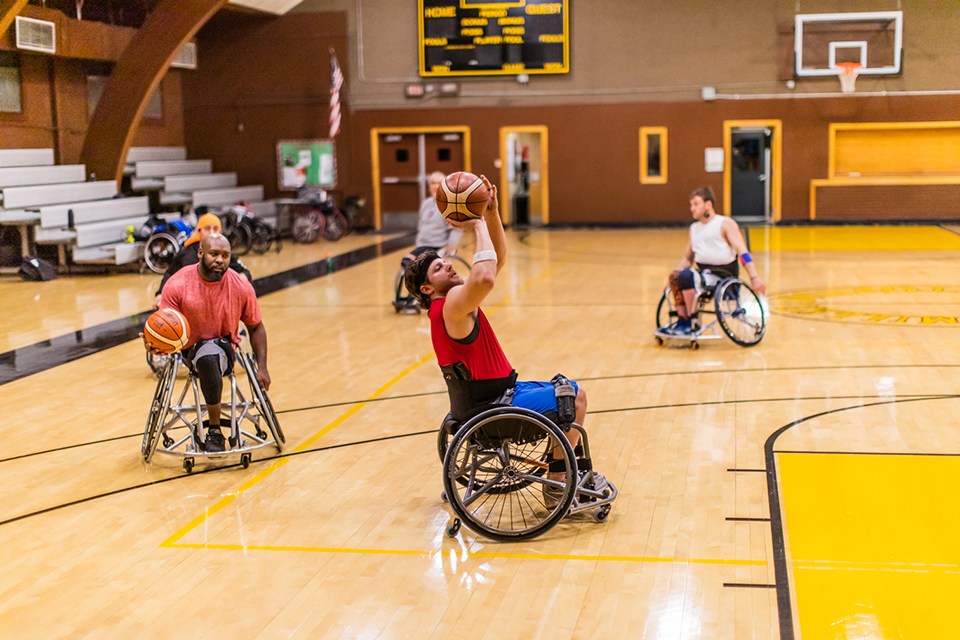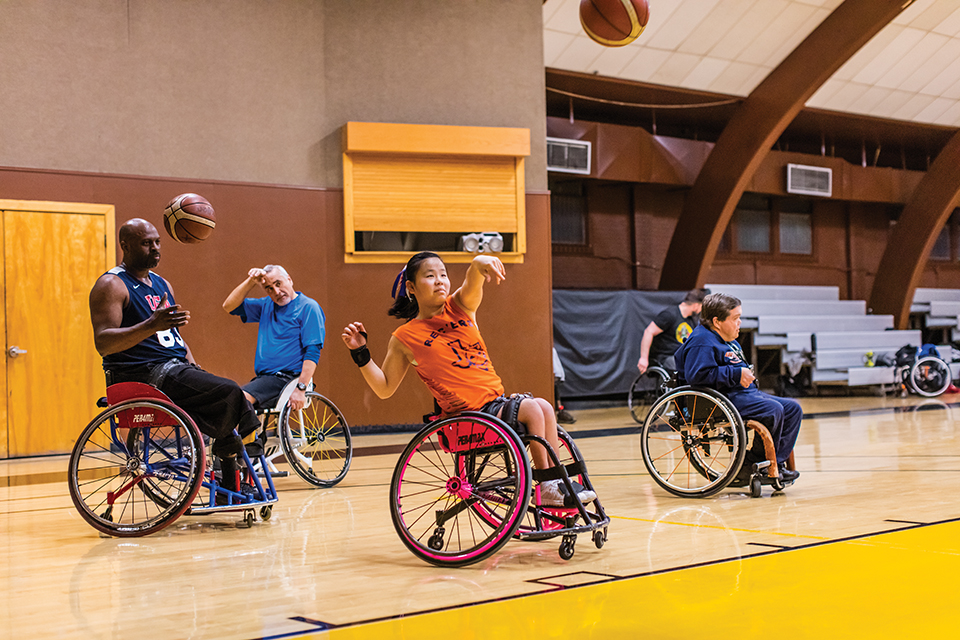Wheels or Wings

Parasports have been around since after WWII when injured veterans needed a means of rehabilitation. Now, the sports have become much more — The Paralympics and paraleagues are growing in popularity and scope across the globe, and universities are starting their own teams and recruiting players with scholarships.
Austin’s very own parasport organization, The Rec’ers, has made a name for itself in the basketball world, not just because of their excellence on the court, but because of the family dynamic that the organization itself promotes. For The Rec’ers, basketball may be the sport, but family is the name of the game. And these guys certainly know what they’re doing.
Watching from the bleachers at the Doris Miller Recreational Center, it’s easy to hear the inside jokes, the friendly taunting and the serious drive echoing through the gymnasium.
With this team, the notion of families coming in all shapes and sizes is just a fact of life. The members are different in almost every way — their backgrounds, their looks, their ages, their aspirations and even their injuries. But there’s a certain drive in each of them that brings them together as nothing else could.
Andy Halm, member of the Rec’ers for 30 years and head coach of the D2 team, explains that that bond extends throughout the whole organization.
“First and foremost, we’re a family,” Halm says.
Halm was paralyzed when he born . He found the Rec’ers in 1989 when he was 14 years old and hasn’t left since. He sits on the sidelines at practices pointing to his players and telling their stories, their habits and their goals in life. He cherishes each member on the team and knows them like the back of his hand.
But this isn’t uncommon for the Rec’ers. They all know each other almost better than they know themselves.
“We actually hang out off the court,” Halm says with a laughs. “We probably spend more time with each other than we do with our wives.”

Lee Brown, an Olympic medal baring paraathlete and the head junior’s coach, also joined the Rec’ers in 1989 with Halm.
But before wheelchair basketball, Brown was on scholarship to play basketball at The University of Arizona until a motorcycle accident took both of his legs. He purchased the bike on a Monday, and the wreck occurred Friday of the same week. But Brown’s resiliency got him back onto the courts as soon as he was released from the hospital.
After speaking to anyone within The Rec’ers organization, Although Brown’s and Halm’s are both amazing stories of strength in the face of adversity, you’ll soon realize that these inspiring themes are a fact of life. They take these stories behind themselves and behind their teammates and use them to push harder, and as a reminder for others as well.
“Just because you’re disabled doesn’t mean you can’t do everything you want to do,” Halm says. “You can still be self-reliant.”
This is one of the main ideas that comes into play at the practices for the juniors teams.
The reinstatement of the juniors teams in 2017 has brought about a whole new perspective for the Rec’ers family dynamic. In just two short years, they went from an empty roster to second in their conference and twelfth in the nation.
When asked how they were able to achieve so much in such a short amount of time with virtually no budget, Brown simply points to the kids and to the organization. Not only are the kids talented and coachable, but the support system that is created by the entire organization allows for a different kind of coaching and a different kind of playing.
“I mean it’s just something about this organization. I hear parents and kids from other teams talking about how they wish they could play for us,” Brown says. “It’s like I tell the kids, I can’t promise anything, but if they come out and play, they’re gonna have fun.”
Not only are the younger players having fun, but they are being mentored all the while by older players. At Sunday practices, every level of player on the court is helping each other, and teaching the common theme of independence.
“We teach them how to fall, how to get up, how to play the sport and how to take care of themselves when no one is around,” Joe Fischer, assistant coach of the juniors team, says.
Fischer and Brown have taken on this role of parental guidance for their players — talking about each child as if they were one of their own.
Quinn Meyer, an 8th grader who plays on the Juniors team, was recruited the way most Rec’ers athletes are — by chance.
“Quinn is my hero,” Fischer says. “She is literally my hero and I tell her that every day.”
Coach Brown encountered her and her family at CiCi’s Pizza and recruited her to play for Rec’ers. Fast forward a few years later and she’s developed into one of team’s top players.
Meyer, who was adopted from China, had to get herself to practice via the Austin bus system as both her parents are legally blind.
When Brown heard this, he stepped in to help.
“When I found out she was pushing herself across the bridge from the Lamar stop to practice I almost had a heart attack,” Brown says with a laugh.
Brown now picks Meyer up for every practice whether from school or home. And if he can’t pick her up, someone else from the team does. They all work together to get their players where they need to be, just as families take care of each other.

After joining the Rec’ers, Meyer sees Brown as another father figure, her teammates like her siblings and team dinners after tournaments and practices as family dinners. She even understands her teammates’ habits.
“If you want to do something, nothing should hold you back,” Meyer says. “But if you do something, you have to go all in. Why half effort anything?”
Meyer’s mentality is exactly what the Rec’ers stand for — and exactly what the coaches are trying to instill in the kids as they grow up in wheelchairs or with prosthetic legs. The idea is that if there is something you want to do, you can do it — no one can stop you and no one has to give you permission or hold your hand.
With this mentality in place, every level of the organization supports each other, knows each other, and cares for each other. The Rec’ers value their family team.
“Ride till we die, baby,” Fischer says.






